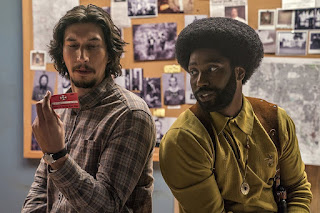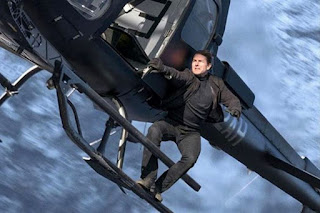Movie of the year: "BlacKkKlansman"
Although it is set in the '70s, Spike Lee's brilliant "BlacKkKlansman" is no period piece.
It is as fresh as Donald Trump calling Omarosa a "dog." As terrifying as a Missouri state House candidate saying "Hitler was right" -- and still winning his primary As chilling as hearing a commentator with Trump's ear complain that "the America we know and love doesn't exist anymore" because of "massive demographic changes."
It's a movie that wants us to think about our own identity even if some forces in this country think that racial, religious and political roles are unambigous -- and if you are not one of "us" (whoever us may be) then you are to be wiped out.
It asks us to consider, no matter how stupid we think some extremists are, they are nonetheless dangerous. And one of them is in the White House.
Based on the memoir by Ron Stallworth, "BlacKkKlansman" follows the infiltration of a Ku Klux Klan chapter by Stallworth (John David Washington), the first black police officer in Colorado Springs.
As you might guess, that infiltration at first happens by telephone, then in person with another officer, Flip Zimmerman (Adam Driver), filling in for Stallworth. The black officer, meanwhile, continues his deception-by-telephone, even making contact with Klansman David Duke (Topher Grace). At the same time, Stallworth is pursuing a relationship with activist Patrice Dumas (Laura Harrier), but keeping his police connection secret from her, considering the way her community feels about local law enforcement.
Ron's trying to reconcile his law-enforcement role (which early on has his spying on his own people) and his blackness (which understands vividly why Patrice feels as she does) is just one of the places where we're asked to consider people's role in the world, and the complications in deciding that place. Flip, a non-practicing Jew, is pushed into considering how strong his Jewishness is because the Klansmen he is conning are not only anti-black but viciously anti-Semitic. (Flip and Ron together remind us both that white supremacists attack other whites, too, and that it will take an alliance of black and white to fight America's worst.)
Going right at Trump's determination to portray some racists as nice folks, there's the wife of one Klansman, played by Ashlie Atkinson; she's a seemingly sweet, smart woman who does not like guff from her husband -- but who has completely embraced his race hatred, cheerfully reeling off slurs and cheering at "Birth of a Nation." And Duke is presented as a prophet, recognizing that racism can make its way into the mainstream under the cover of other political issues.
The ones most certain about their place are the Klansmen, determined to keep and protect a white-dominated world, and offering up declarations about making America great and "America First" which not only reflect their time but ours. They are also the biggest fools in the movie, so certain of their knowledge that Duke, for one, is certain he could spot a black person on the phone by the way he or she spoke. But their absurdity is actually a mask for their menace. Authorities who choose to see them as a joke merely set the stage for a mass-murder plot. And even if extreme violence is to be fought, the deeper rot embodied by the Klansmen is never halted. The climactic moment in the film illustrates all that Stallworth has faced in terms of his identity, his job and his social place.
Which, alas, is where we still are. Lee begins "BlacKkKlansman" with the making of a racist lecture film (with Alec Baldwin as the lecturer) and ends with scenes from the Charlottesville riots and its aftermath. Thus we get both a man known for playing Trump spewing bile and, at the end, Trump himself arguing that some of Charlottesville's white-is-right-ists were fine people. Baldwin's Trump is a joke, those scenes imply, but what he believes is no joke at all.



Comments
Post a Comment